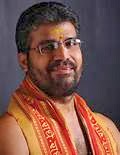The Truth of Srimad Bhagavatam : 2.
The conception of God and the conception of Absolute Truth are not on the same level.
The Srimad-Bhagavatam hits on the target of the Absolute Truth.
The conception of God indicates the controller, whereas the conception of the Absolute Truth indicates the summum bonum or the ultimate source of all energies.
There is no difference of opinion about the personal feature of God as the controller because a controller cannot be impersonal.
Of course modern government, especially democratic government, is impersonal to some extent, but ultimately the chief executive head is a person, and the impersonal feature of government is subordinate to the personal feature.
So without a doubt whenever we refer to control over others we must admit the existence of a personal feature.
Because there are different controllers for different managerial positions, there may be many small gods.
According to the Bhagavad-gita any controller who has some specific extraordinary power is called a vibhutimat sattva, or controller empowered by the Lord.
Here are many vibhūtimat sattvas, controllers or gods with various specific powers, but the Absolute Truth is one without a second.
This Srimad-Bhagavatam designates the Absolute Truth or the summum bonum as the param satyam.
The author of Srimad-Bhagavatam, Sri Vyasadeva, first offers his respectful obeisances unto the paraṁ satyam (Absolute Truth), and because the paraṁ satyam is the ultimate source of all energies, the paraṁ satyam is the Supreme Person.
The gods or the controllers are undoubtedly persons, but the paraṁ satyam from whom the gods derive powers of control is the Supreme Person.
The Sanskrit word isvara (controller) conveys the import of God, but the Supreme Person is called the parameśvara, or the supreme isvara.
The Supreme Person, or parameśvara, is the supreme conscious personality, and because He does not derive any power from any other source, He is supremely independent.
In the Vedic literatures Brahma is described as the supreme god or the head of all other gods like Indra, Candra and Varuna, but the Srimad-Bhagavatam confirms that even Brahma is not independent as far as his power and knowledge are concerned.
He received knowledge in the form of the Vedas from the Supreme Person who resides within the heart of every living being.
That Supreme Personality knows everything directly and indirectly.
Individual infinitesimal persons, who are parts and parcels of the Supreme Personality, may know directly and indirectly everything about their bodies or external features, but the Supreme Personality knows everything about both His external and internal features.




Comments